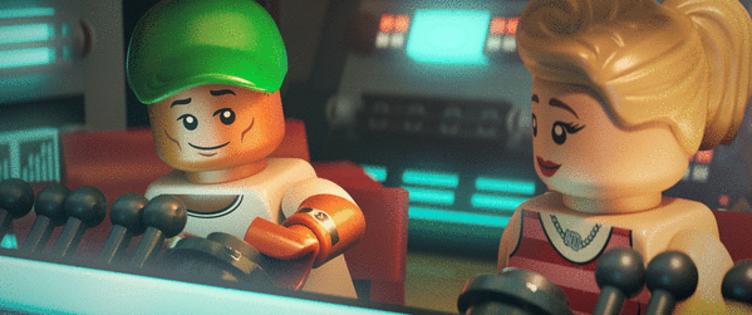Review: Lego format helps Pharrell Williams tell his story in 'Piece by Piece'
Published in Entertainment News
A documentary about Pharrell Williams rendered entirely as a Lego movie? It’s understandable to be a bit skeptical of this gimmick, but in “Piece by Piece,” directed by Oscar-winning documentarian Morgan Neville, it’s a gimmick that works. In an introductory bit of conversation about the film between the subject and director, it’s explained how the Lego style affords the somewhat mysterious and inscrutable Williams a shield that allows him to let his guard down while sharing his personal story. It also comes to make thematic sense in the larger narrative about how he understands his life and the context in which he exists.
Of course, the Lego style is also just fun, a spin on the usual biographical documentary which tells the story of a creative genius through talking head interviews and archival footage. Everything here is Lego: the interviews, the music videos, the home movies, the scenes of Williams returning to his hometown of Virginia Beach to perform a homecoming concert. The style is funny and cute, and while it offers him a modicum of privacy, it also makes you want to revisit the real thing when the film is over.
Williams’ career started in the era of the big-budget blockbuster music video in the late 1990s and early 2000s, so there is plenty of material to search in his back catalog. If anything, “Piece by Piece” is a reminder that the musician, now known for family-friendly bops like “Happy,” is responsible for some of the biggest, and most addictive, hip-hop hits of the turn of the century, in partnership with his collaborator and childhood friend Chad Hugo, with whom he produced hit after hit as the Neptunes.
Much of “Piece by Piece” is about Williams’ dreamy and imaginative childhood, which built the foundation for his career. Growing up in a Virginia Beach housing project, he was inspired by his proximity to the ocean, the Blue Angels fighter jets that roared overhead, Carl Sagan on TV, his grandmother and especially his peers. Williams grew up with Timbaland and Missy Elliott, met Hugo in band class, and later produced songs for a variety of local rappers. As a high school band, the Neptunes were discovered by Teddy Riley, who had a recording studio nearby, giving them their first big break in the industry.
Though Williams dreamed of being a frontman, the Neptunes became the hottest hip-hop producers of the late ‘90s, dreaming up dizzying beats for the likes of Jay-Z, Snoop Dogg, Mystikal, Busta Rhymes and more, and branched into pop music, producing for Britney Spears, Justin Timberlake and No Doubt. The Lego conceit proves an ideal format for visually embodying these beats, as bouncing abstract creations spring and jiggle to musical life.
It’s hard to overstate the Neptunes’ influence on music and pop culture at the dawn of the 2000s, and as their own hip-hop group N.E.R.D., Williams and Hugo helped to evolve rap and hip-hop from the blinged-out models and bottles posturing of the ‘90s to something cooler and more alternative, infusing skateboard style and rock influence into their music and fashion.
Neville’s film follows a traditional format: creative genius and outlier grows up in a humble but supportive environment; he strives to find success and does; there’s a minor dip in creativity as he stretches himself too thin and collaborative relationships evolve; ultimately he finds new inspiration and connection to his roots both artistic and historic. But Neville also isn’t interested in asking tough questions or probing too deeply. Despite, or rather, because of the Lego format, this isn’t a searing interrogation but a celebrity-friendly portrait.
Neville does manage to bring the film — including its childlike style — around to an idea that resonates. Much like building with Legos, sampling music involves taking disparate pieces and elements and putting them together brick by brick. This idea runs throughout the film, and by the end, both Williams and Neville expand the concept beyond just making music. Williams observes that the world around us, society itself, is constructed and designed. There’s a freedom in that idea because it means that there is potential for change, that the world can be remade and remixed by us, a concept that Neville introduces in tandem with the Williams-produced “Alright” by Kendrick Lamar, a song that became somewhat of an anthem during the Black Lives Matter movement in 2020.
“Piece by Piece” is ultimately a surprisingly moving biography, and a resonant reminder of Williams’ outsize cultural footprint. The Lego format doesn’t cheapen the power of Neville’s message, but rather reflects the quirky, outside-the-box thinking of the artist himself, who has always marched to the beat of his own drum, steering the cultural ship according to his unique point of view.
———
‘PIECE BY PIECE’
3 stars (out of 4)
MPA rating: PG (for language, some suggestive material and thematic elements)
Running time: 1:33
How to watch: In theaters Oct. 11
———
©2024 Tribune Content Agency, LLC













Comments